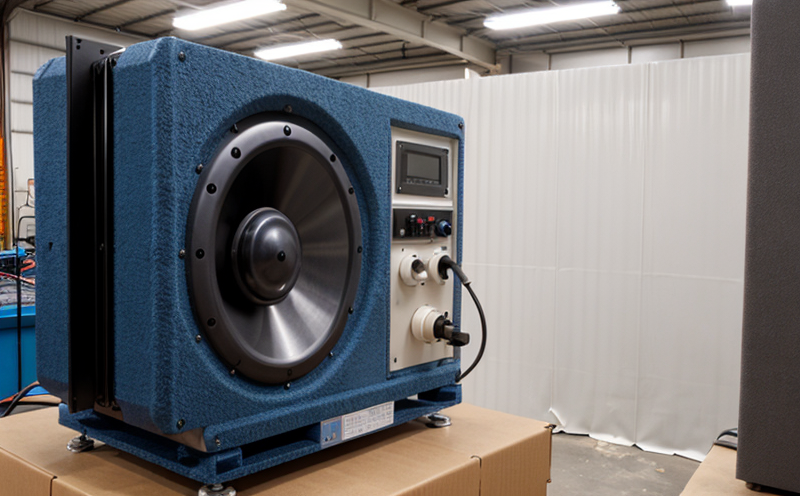ISO 11202 Refrigerator and Freezer Noise Testing
The ISO 11202 standard specifies a procedure for measuring noise emitted by refrigerators and freezers. This test ensures that the products meet international standards on sound emission levels, which is crucial for consumer safety and compliance with environmental regulations.
Consumer goods such as refrigerators and freezers are expected to operate quietly in residential settings where noise can be a significant factor affecting user comfort. The standard aims to provide a uniform method of measurement that ensures consistent product quality across manufacturers while minimizing the impact on users' living environments.
The test procedure involves placing the appliance in a sound-insulated room and measuring the sound pressure level at various points around the unit using an A-weighted sound level meter. The testing must be conducted under specific conditions, including ambient temperature and relative humidity to ensure accurate results.
Once the noise levels are measured, they are compared against the specified limits outlined in ISO 11202. Compliance with these standards is essential for manufacturers looking to ensure their products meet international safety and environmental regulations. Failure to comply can lead to product recalls, legal issues, and damage to brand reputation.
For quality managers responsible for ensuring compliance across multiple jurisdictions, this test provides a clear path forward. By adhering to ISO 11202, manufacturers can avoid potential pitfalls in market entry requirements and ensure seamless international trade.
R&D engineers involved in product development can benefit greatly from understanding the implications of noise levels on user experience. This knowledge helps guide design decisions that aim for quieter operation without compromising functionality or performance. Similarly, compliance officers play a critical role in ensuring products meet regulatory standards, making ISO 11202 an important tool in their arsenal.
Procurement teams also need to be aware of these standards as they negotiate contracts with suppliers and specify the requirements in purchasing documents. Ensuring that suppliers understand and adhere to ISO 11202 helps maintain consistent quality throughout supply chains.
The testing process is straightforward but requires precise instrumentation and controlled conditions to yield reliable results. By investing in this type of testing early in the product development cycle, manufacturers can identify potential issues before they become costly problems downstream.
In addition to meeting regulatory requirements, compliance with ISO 11202 also contributes positively to brand reputation by demonstrating a commitment to user comfort and satisfaction. Consumers increasingly value quiet appliances, so meeting these standards positions brands favorably in the market.
Understanding the nuances of this standard is essential for those involved in any aspect of manufacturing or distribution of refrigerators and freezers. Familiarity with ISO 11202 helps stakeholders make informed decisions about product design, quality control measures, and regulatory compliance strategies.
Why Choose This Test
Selecting the appropriate noise testing method is critical for ensuring accurate measurement of sound emissions from refrigerators and freezers. ISO 11202 offers several advantages over other methods:
- Precision Measurement: The standard provides detailed guidelines on how to set up a laboratory environment, select appropriate equipment, and conduct measurements accurately.
- Consistency: By following the same procedures globally, manufacturers can ensure consistent results across different locations and batches of products.
- Regulatory Compliance: Adherence to ISO 11202 helps avoid non-compliance penalties and potential disruptions in international trade.
- User Satisfaction: Quieter appliances enhance user experience, leading to higher satisfaction rates among consumers.
The test also benefits manufacturers by providing a competitive edge through improved product performance. Consumers are increasingly demanding quieter products, making compliance with ISO 11202 an attractive feature for marketing campaigns and customer relations.
Moreover, the standard supports continuous improvement in product design. Engineers can use feedback from noise testing to refine designs and reduce sound levels further while maintaining efficiency and functionality.
International Acceptance and Recognition
The ISO 11202 standard is widely accepted and recognized by various countries and organizations around the world. Its adoption has facilitated international trade in refrigerators and freezers, ensuring that products meet consistent noise emission standards regardless of geographical location.
Many national standards organizations have adopted or referenced ISO 11202 as part of their regulatory frameworks. This acceptance ensures that manufacturers can easily navigate different markets without having to comply with multiple sets of regulations.
The standard's global recognition also enhances brand reputation, allowing companies to market their products internationally confidently. Consumers trust brands that adhere to international standards like ISO 11202, which adds value and credibility to the product offerings.
In addition to regulatory compliance, the acceptance of this test contributes significantly to environmental sustainability efforts. Quieter appliances contribute less noise pollution, promoting healthier living environments for all users.
Competitive Advantage and Market Impact
The ISO 11202 standard offers several ways for manufacturers to achieve a competitive advantage in the marketplace:
- Better Product Quality: Compliance ensures that products meet stringent noise emission standards, leading to superior product quality.
- Increased Customer Trust: Consumers are more likely to choose brands that adhere to recognized international standards.
- Easier Market Access: By meeting ISO 11202 requirements, manufacturers can enter new markets with reduced barriers and compliance issues.
- Enhanced Brand Reputation: Consistent performance across different regions enhances brand reputation and customer loyalty.
The standard also supports innovation by encouraging manufacturers to explore quieter technologies. This focus on reducing noise levels drives technological advancements that benefit both the industry and consumers.
In conclusion, ISO 11202 provides a robust framework for measuring refrigerators' and freezers' noise emissions accurately. Its widespread acceptance and recognition ensure consistent quality and compliance worldwide, offering manufacturers significant benefits in terms of competitive positioning and market success.





